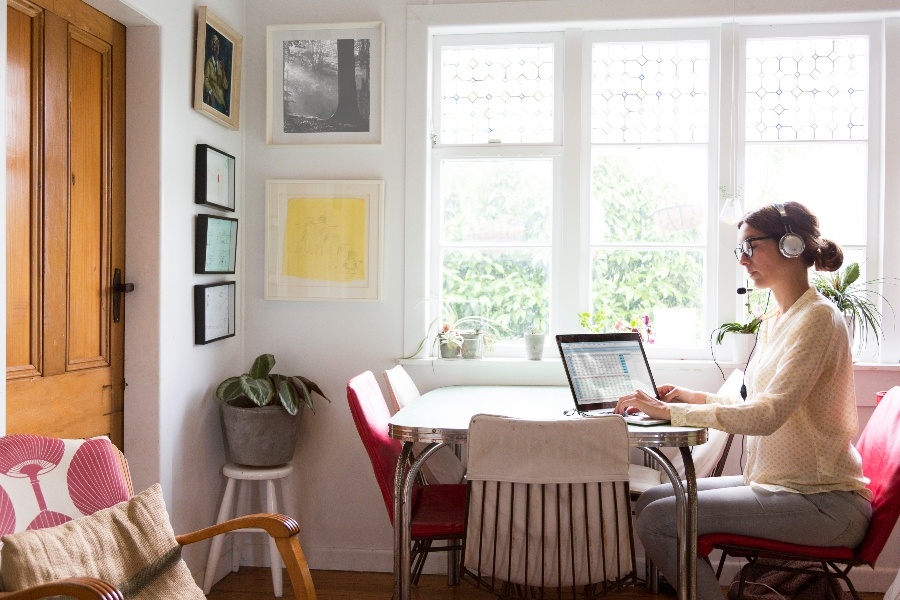Working From Home Can Mean You Never Stop Working. Here Are 8 Tips for Better Work-Life Balance.
From creating a designated office to carving out time for yourself, here’s how you can feel a little better working from home.

Working from home? Here are eight tips from Philadelphia career coaches on how to better balance business demands and personal life. / Photograph courtesy of Getty Images.
For the majority of folks, work is work and home is home. But when your home suddenly becomes your work space, it can be tough to separate the two. (Though, we’re here for all the guest pet appearances during video conferences. Shut up, New York Times.)
Though working from home is a privilege during these incredibly difficult times, it can still be extremely anxiety-ridden. It’s sometimes hard to set boundaries and know when to turn off and stop working. While there’s not a one-size-fits-all approach to working from home — as everyone’s jobs and lives are different — here are eight tips from local career coaches that’ll make balancing personal life and professional life a little bit easier, for those of us lucky enough to be working from home.
Create a schedule
To help keep you focused and feel some semblance of “normalcy” while working from home, our experts agree that creating a general schedule is key. Kelly Poulson recommends maintaining the hours you already work. For instance, if you start at 9 a.m. and finish at 5 p.m. when you’re in the office, you should try adhering to that schedule at home. If your situation at home dictates otherwise, Nikki Gringrich suggests you decide when you will have work blocks and when you will have personal blocks, which is especially helpful if you have kids or other family members at home.
Communicate that schedule with your boss and housemates
Just because you are at home does not mean you are available 24/7. If you need to create a schedule different from what you usually work, communicate that with your boss or supervisor, so they are aware of when you plan to be online and actively working.
Joyel Crawford says you should also set boundaries with your partner or whoever is also at home, so that you and they can keep the work-from-home environment business-focused during business hours. Crawford and her husband have lunch at different times since they are on different schedules, and they don’t discuss household-related things until they are both done working for the day.
If you have kids and your spouse is working from home, too, coordinate a schedule that works for both of you and the kids. Gingrich says this might be a split schedule, so only one of you is working at a time. A divide-and-conquer approach can help make caregiving a little bit easier (and keep kids occupied!).
Establish daily priorities
Even though you’ve created a schedule for your working hours, your routines are likely to be disrupted during this time. Julie Cohen, CEO of and executive coach at Work. Life. Leader., suggests you start each morning determining three or four tasks or goals that you want to accomplish that day. She says you should set your bar lower than normal, not because you aren’t capable, but because you’re likely to be pulled in different directions unexpectedly by personal demands, or changing work projects.
Rita Friedman says brief, frequent check-ins with your coworkers and boss might be very useful in executing those tasks, even if it’s not your typical rhythm. “Depending on the type of work you’re in, you might say that you will still clock the same number of hours, but need to break them up throughout the day or week, or you might discuss which projects you anticipate being able to complete by the end of the day or week.”

Photograph courtesy of Getty Images.
Have a designated “office”
All our experts agree that having a designated “office” can help put you into a work mindset. The key is to create or find a space that best suits your current situation — just because a setup worked for you before doesn’t mean it will meet your current needs. As Friedman notes, if your previously private living room corner now feels like you’re in some echo chamber of an open office, it might make sense to set aside a corner of the bedroom that serves as your office space, and “maybe you drape a sheet over it or temporarily relocate a dresser so that you don’t wake up looking at your work.” If you’re claiming a new space for work and you don’t live alone, she suggests hanging up a daily sign — either outside your office or in a common area — with times you can and cannot be interrupted.
Have rituals for logging on and logging off
Before you log-on for the day, figure out what you need in order to get in the zone and be productive. Maybe you stretch for 10 minutes, put on actual work clothes, or take time to enjoy every sip of your morning coffee. Once you’re ready to log-off, complete a ritual that signifies the end of the work day and beginning of “me time,” like having a phone alarm go off, physically changing out of your work clothes, or putting your computer out of sight.
Wear noise-cancelling headphones or earbuds
Even if you have your separate office space, your housemates or people taking walks outside will be making noise. Gingrich says investing in noise-cancelling headphones or earbuds can help you concentrate and focus without the distraction.
Don’t sit all day
At home, you might not have that handy standing desk, which means you might forget that you aren’t glued to your chair! Experts have argued that working from home can ruin your posture; therefore, it’s recommended that you move your body every 30 minutes. Crawford suggests walking around during your conference calls, especially if you don’t have to be on camera. “It’s a great way to get in your steps, and can open your mind for clear ideas and inspiration,” she says.
Carve out time for yourself
Now that you’re working from home, it’s super easy to fall into the trap of spending all your time doing work-related tasks. But Cohen reminds us that maintaining your energy, focus, and productivity requires investment in your own wellness. The solution? Find and consistently do what works for you, so you can spend some time alone.
As Poulson says, “Don’t feel obligated that self-care [has to be] meal prepping or exercising, if that’s not your jam. It could be 10 a.m. puppy videos on YouTube or a piece of chocolate every day at 3 p.m.” Whether you’re meditating every morning or walking your dog at lunchtime, make sure whatever you’re doing eases your mind and gives you a reprieve from business.
Want to hear more from us? Join Be Well Philly at:
FACEBOOK | INSTAGRAM | NEWSLETTER | TWITTER


